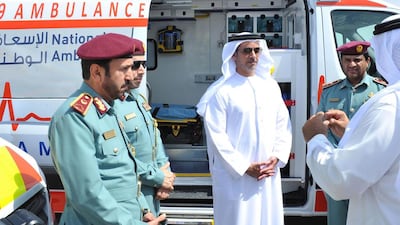ABU DHABI // An expanded network of ambulance services to the Northern Emirates will reach patients in remote areas, reduce response times and save lives.
Eight new key ambulance points and 22 sub-locations will provide a rapid response to emergency call-outs to Ras Al Khaimah, Umm Al Quwain, Ajman, Sharjah and Fujairah.
Twenty new Mercedes ambulances will be fully equipped with the latest state-of-the-art equipment, with 179 new paramedics providing round-the-clock coverage across the five emirates.
“Saving souls is a sacred duty, one that must not be lightly considered,” Sheikh Saif bin Zayed, a Deputy Prime Minister and Minister of Interior, said as he announced the National Ambulance Project.
Dr Biniam Tesfayohannes, head of the emergency department at Mafraq Hospital in Abu Dhabi, said the first minutes after an accident were vital in reducing the risk of fatality.
“There is a common mantra; the first hour in any accident is what we call the ‘golden hour’,” he said.
“The sooner you can get a patient into a hospital then the sooner you can start assessing the condition and assigning a specialist. The quicker you are, the better the result.”
While some patients can wait two to three hours to receive treatment, others, such as those involved in a road traffic accident, do not have that luxury, he said.
“They need to get treated quickly otherwise they will be dead,” he said.
“For example if you get there in five minutes to someone with a blocked airway you will have a better chance of saving that life.”
Sheikh Saif said the National Ambulance Project was under the guidance of the President, Sheikh Khalifa, who wanted to provide the necessary resources to ensure ambulance services of international standards.
It follows a complaint that ambulances in parts of the country were taking too long to arrive. Last month the President asked for an investigation and a study on ambulance response times, with a global comparison.
In London, for example, the target is to reach 75 per cent of Category A – those classed as immediate and life-threatening – call-outs within eight minutes.
An agreement has been reached with Harvard University to train Emirati emergency medics, said Sheikh Saif.
“In the next two years your Emirati brothers and sisters will helm these emergency response points,” he said.
With the difference between lives saved and lost often down to a matter of minutes, Faisal Abdullah Al Tenaiji, FNC member from Ras Al Khaimah, has welcomed the news saying it would help rescuers reach accident scenes quicker.
“It is really good news,” said Mr Al Tenaiji. “This will save lives, there is no doubt about it.”
A current shortage of emergency services puts patients who have been injured in an accident or those who live in remote areas far more at risk because of longer ambulance waiting times.
“This, of course, will minimise the risk,” he said. “This will reduce the amount of time people have to wait for help.”
Mr Al Tenaiji said RAK residents had approached him to complain about the lack of emergency service offerings in the emirate and slow response times so he was pleased to hear about the announcement.
“People have come to me regarding the lack of services especially in the emergency sector. I had planned to ask the question myself but it appears Sheikh Saif is reading our minds,” he said.
Sheikh Saif called on those involved in the National Ambulance Project to spare no effort “to ensure speed of response and exert absolute efficiency to save lives”.
The project will be managed by the Ambulatory Healthcare Services in Abu Dhabi through a call centre operated by 35 bilingual medical operators trained to provide services in Arabic and English.
Mr Al Tenaiji said the project was the latest development for better access to the Northern Emirates and improving healthcare service in the area.
Last year the Minister of Health promised better health care in the Northern Emirates after FNC members complained that services lagged far behind what was available in Abu Dhabi and Dubai.
They said there was a shortage of doctors, services and medication and a need for tighter supervision, and blamed a lack of coordination between the minister and local health authorities.
However there has been recent moves to boost healthcare in the area including a new Dh1 billion flagship 248-bed Sheikh Khalifa Specialised Hospital in Ras Al Khaimah, a Dh60 million grant for expansion and development of Saqr Hospital in RAK and a new Dh750 million hospital in Umm Al Quwain, which opened in December.
jbell@thenational.ae

